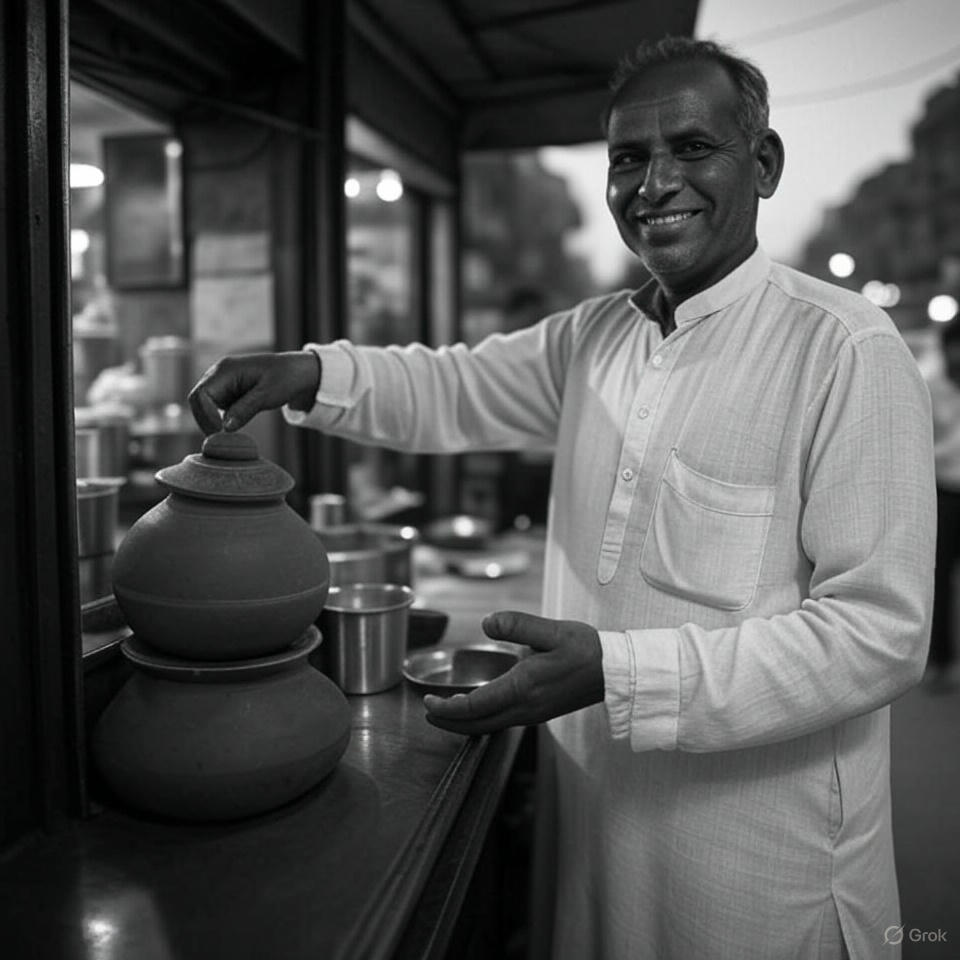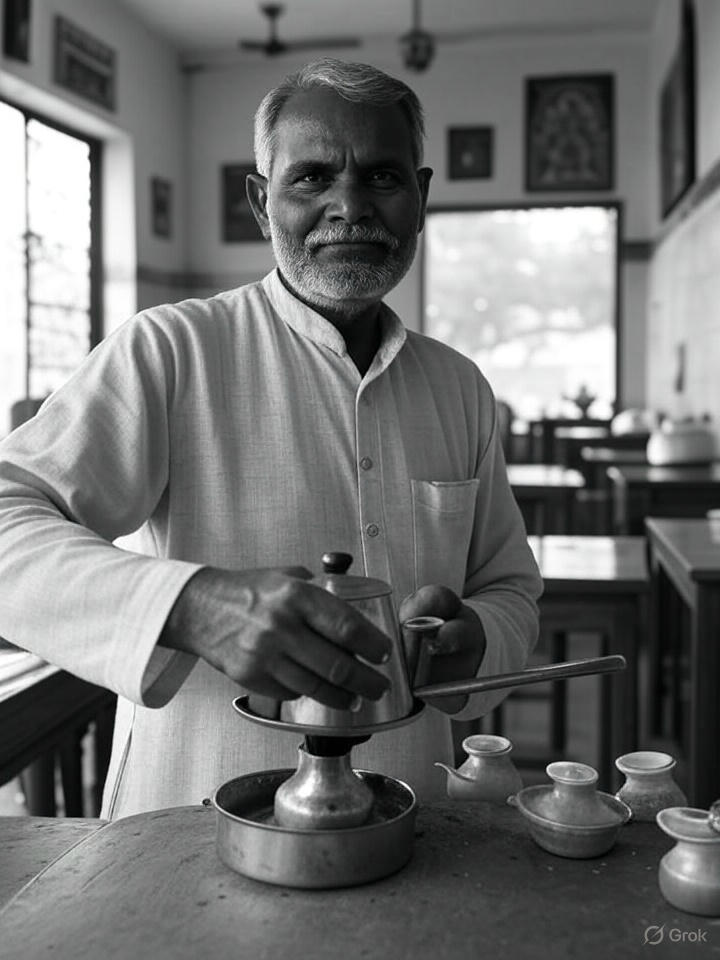Introduction: Steeped in Opportunity – The Indian Tea Dream
India’s relationship with tea isn’t just about a beverage; it’s a deeply ingrained cultural ritual, a moment of pause, and a booming tea business opportunity. From the ubiquitous roadside chaiwallah to chic tea cafe chains, the demand for a good cup of Indian tea is insatiable. This evergreen market, driven by affordability, daily habit, and evolving tastes for premium blends and experiences, presents a fertile ground for entrepreneurs. The critical decision at the heart of your startup journey is this: do you forge your own unique path with an independent tea shop, or leverage the power of an established franchise model? This comprehensive guide walks you through every step, ensuring your venture steeps to perfection.

I. Groundwork: Research & Conceptualization – Laying the Foundation
Before boiling the kettle, meticulous planning is non-negotiable. This phase is crucial for both independent and franchise routes:
- Deep Market Research:
- Location, Location, Location: This is paramount. Analyze high-footfall areas – near offices, colleges, markets, or transport hubs. Assess competition density, local demographics, visibility, accessibility, and crucially, rental costs. A prime location near offices might command higher rent but guarantee morning and evening rushes.
- Know Your Audience: Who are you serving? Time-pressed office-goers needing a quick grab-n-go? Students seeking a hangout? Families looking for a relaxed sip? Define their preferences – price sensitivity, speed expectations (traditional quick chai vs. slow-brewed specialties), and ambiance desires.
- Competition Audit: Study existing players – local stalls and organized chains. What are their prices, menu planning strengths, ambiance, peak times, and weaknesses? Identify gaps you can fill.
- Define Your Niche & Core Concept:
- Independent Path: What makes you unique? Capitalize on tea culture. Examples: specializing in rare tea varieties (Darjeeling First Flush, Nilgiri frost tea), organic/farm-direct sourcing, regional specialties (Kashmiri Kahwa, Mumbai cutting chai), fusion snacks, a specific thematic ambiance (heritage, minimalist, book cafe), or a health-conscious menu (herbal infusions, sugar-free options).
- Franchise Path: Research brands aligning with your target market, budget, and values (e.g., Chai Point for efficiency, Chaayos for customization, local emerging franchises). Understand their model, support, and brand identity.
- Core Offering: Regardless of model, exceptional tea quality is the bedrock. Decide on your signature brews and complementary snacks (samosa, sandwiches, muffins, biscuits) – will you prepare them in-house or outsource?
- Craft a Robust Business Plan: This is your roadmap and essential for securing investment. Include:
- Executive Summary
- Detailed Market Analysis
- Clear Concept Description & Menu Outline
- Management Structure
- Critical Financial Projections: Realistic startup costs (location fit-out, equipment, licensing, initial inventory), monthly operating expenses (rent, utilities, staff, ingredients), pricing strategy, sales forecasts, break-even analysis, and funding requirements (personal savings, bank loan, investors). Detail how you’ll achieve profitability.

II. Choosing Your Brew: Independent Startup vs. Franchise Model
This fundamental choice shapes your entire journey:
- The Independent Tea Shop Route:
- Pros: Complete creative control over brand, menu, and ambiance. Potential for higher profit margins (no ongoing royalties). Flexibility to adapt quickly to local trends. The satisfaction of building your own brand.
- Cons: Significant challenge in building brand recognition from scratch (requires strong marketing effort and budget). Higher inherent risk. Responsible for everything – sourcing (supplier relationships), recipe development, branding, marketing, navigating regulations. Steeper learning curve.
- Ideal For: Visionary entrepreneurs with deep tea culture knowledge, culinary creativity, strong marketing skills, higher risk tolerance, and a unique concept.
- The Franchise Tea Business Route:
- Pros: Instant brand recognition and established customer trust. Proven franchise model with a successful business blueprint. Comprehensive training and ongoing operational support. Marketing assistance (national/regional campaigns). Potential for bulk purchasing power via the franchisor. Faster setup process. Lower perceived risk due to a tested system.
- Cons: Significant upfront franchise fee and ongoing royalties (typically 5-15% of revenue), directly impacting profitability. Strict adherence to brand standards (limited menu/ambiance flexibility). Potential territory restrictions. Success is partly tied to the franchisor’s overall reputation and decisions.
- Ideal For: First-time entrepreneurs seeking structure and support. Those who prefer the security of a known brand. Individuals with capital but less specialized tea expertise. Those wanting a potentially faster route to market.
- Decision Factors: Weigh investment level (franchise usually requires higher initial capital), desired level of control, need for support, personal risk appetite, long-term profitability goals, and your own skills/passion.
III. Securing the Essentials: Legalities, Location & Setup
Turning plans into reality involves critical logistics:
- Legal Structure & Compliance (Navigating Regulations):
- Choose a Business Structure: Consult a Chartered Accountant. Options: Sole Proprietorship (simplest), Partnership, Limited Liability Partnership (LLP), or Private Limited Company (offers liability protection). Your choice impacts licensing, taxes, and liability.
- Mandatory Registrations & Licensing:
- Business Name Registration: For independents; franchises use the franchisor’s name.
- GST Registration: Essential for any business with turnover above threshold (mandatory for most shops).
- Shop & Establishment Act License: State-specific, governs working conditions.
- FSSAI License: THE MOST CRITICAL. Food Safety and Standards Authority of India license is non-negotiable for handling food/beverages. Apply based on your scale (Basic or State License). Strict adherence to FSSAI hygiene regulations is paramount.
- Others: Trade license from local municipality, fire NOC (if applicable), signage permit. Franchises often get guidance on this.
- Location Acquisition & Design:
- Secure your chosen location with a clear, negotiated lease agreement.
- Design & Layout: Prioritize efficient workflow (service counter, brewing/prep area, seating if offered) and impeccable hygiene. Ensure adequate storage. Franchises must follow strict brand design guidelines.
- Renovation & Ambiance: Create an atmosphere reflecting your concept – bright and efficient for quick service, warm and cozy for a tea cafe experience. Invest in clear, attractive signage.
- Sourcing Equipment & Building Supplier Relationships:
- Essential Equipment: Commercial tea brewers/urns (critical volume), high-capacity water filters/boilers, deep refrigerator/freezer, food prep sinks/stations, Point-of-Sale (POS) system, exhaust hood (if cooking), display counters, durable furniture, and high-quality crockery/disposables.
- Franchise Note: Franchisors typically mandate specific equipment suppliers and models.
- Finding Reliable Suppliers: Source trustworthy vendors for core ingredients:
- Tea Leaves: Build relationships with suppliers for consistent quality Indian tea (Assam for strength, Darjeeling/Nilgiri for aroma, blends). Consider origin and grade.
- Dairy: Reliable, quality milk supply is vital. Negotiate contracts.
- Groceries: Sugar, spices (ginger, cardamom), snacks (outsourced or ingredients for in-house).
- Disposables: Cups, lids, stirrers, napkins – balance cost and quality. Consistency from your supplier is key to maintaining your standard.
IV. Perfecting the Pour: Menu, Operations & Team
The heart of your tea business beats here:
- Masterful Menu Planning:
- Independent: Develop and rigorously test your recipes. Focus on consistency – every cup of masala chai should taste the same. Showcase your unique tea varieties (black, green, herbal, iced). Curate complementary snacks that align with your brand (e.g., healthy bites for a wellness-focused shop, indulgent treats for a cozy cafe).
- Franchise: Implement the franchisor’s menu precisely. Master their standardized recipes and procedures.
- Pricing Strategy: Calculate costs meticulously (tea, milk, sugar, gas, labor, rent, packaging). Factor in competitor pricing but emphasize the value of your quality and experience. Consider portion strategies (“cutting” vs. full cup).
- Hiring & Training for Excellence (Customer Service Focus):
- Recruitment: Look for staff (brewers, servers, cashiers, cleaners) with a positive attitude, willingness to learn, and hygiene consciousness. Customer service is paramount in the tea shop experience.
- Rigorous Training:
- Tea Mastery: Standardized brewing SOPs (water temperature, steeping times, milk ratios, spice blends).
- Hygiene Protocol: FSSAI standards, personal hygiene, cleaning schedules.
- Customer Service: Greeting etiquette, order handling, complaint resolution, upselling techniques, maintaining a warm atmosphere.
- POS & Operations: Efficient order processing, cash handling, opening/closing routines.
- Franchise: Leverage the franchisor’s comprehensive training programs.
- Establishing Standard Operating Procedures (SOPs): Document every process clearly – opening/closing checklists, daily/weekly cleaning routines, precise brewing methods, inventory management, stock rotation, cash handling, safety protocols. SOPs ensure consistency, quality, and smooth operations, especially during staff turnover.

V. Spreading the Word: Marketing & Launch Strategies
Build buzz and attract your first customers:
- Pre-Launch Buzz Generation:
- Local Marketing: Distribute eye-catching flyers in the neighborhood. Partner with nearby businesses (e.g., offer discounts to employees). Utilize local community boards and social media groups.
- Digital Presence: Create dedicated social media pages (Facebook, Instagram) before opening. Post “Coming Soon” teasers, behind-the-scenes glimpses, and introduce your concept. Claim and optimize your Google My Business listing – this is essential for local search visibility. Franchises should amplify the brand’s national campaigns locally.
- Signage: Use “Opening Soon” banners effectively.
- Grand Opening: Make a splash! Offer compelling promotions (Buy One Get One Free, discounts on combos, free sampling). Ensure your team is fully prepped for smooth service. First impressions are lasting.
- Ongoing Marketing for Sustained Growth:
- Digital Dominance: Maintain active, engaging social media with high-quality photos/videos of your tea varieties and snacks. Run targeted local ads. Encourage online reviews (respond promptly!). Implement a simple loyalty program (digital stamp cards, WhatsApp group offers). Optimize your Google My Business listing with photos, updates, and responding to reviews.
- Hyper-Local Engagement: Build customer service into your DNA – word-of-mouth is powerful. Participate in or sponsor local community events. Offer catering for small local office meetings. Build relationships with regulars.
- In-Store Experience: Never underestimate the power of a clean shop, consistently great tea, speedy service, and genuinely friendly staff. This is your most potent marketing tool.
VI. Financial Stewardship: Ensuring Profitability
Keep a close eye on the numbers to keep your tea business brewing profitably:
- Meticulous Tracking: Implement daily sales tracking (POS systems help). Maintain strict inventory control to minimize wastage and spoilage. Track all expenses diligently.
- Cost Control & Pricing: Regularly review ingredient costs (milk, sugar, gas are volatile). Adjust pricing strategically if necessary, but always protect your margins. Understand your Cost of Goods Sold (COGS) intimately.
- Cash Flow Management: Ensure sufficient working capital to cover day-to-day operations – paying suppliers, staff salaries, rent, and utilities on time is critical. Forecast cash flow needs.
- Compliance: File GST returns and pay taxes promptly. Renew all licensing (FSSAI, Shop Act) well before expiration.
VII. The First Cup & Beyond: Nurturing Growth
Launching is just the beginning. Focus on sustainability and evolution:
- Listen & Adapt: Actively seek customer service feedback (verbally, via comment cards, online reviews). Be prepared to tweak your menu, adjust operating hours, or refine service based on demand and feedback.
- Consistency is King (or Queen!): Deliver the same high-quality taste, service, and cleanliness every single day. This builds trust and loyalty, core to profitability.
- Hygiene is Non-Negotiable: Maintain impeccable standards. Regular deep cleaning, staff hygiene enforcement, and safe food handling are essential for FSSAI compliance and your reputation.
- Value Your Team: Invest in your staff. Fair treatment, recognition, and opportunities for growth foster loyalty and reduce turnover, directly impacting customer service quality.
- Growth Strategies:
- Independent: Explore a second location, catering services for events/offices, retailing your signature tea blends, or diversifying into light meals.
- Franchise: Excel in your first unit to potentially qualify for opening additional franchise outlets within the network.
Conclusion: Pouring Passion into a Profitable Future
Starting a tea shop in India, whether your own independent dream or a franchise partnership, is an exciting venture deeply connected to the nation’s tea culture. It demands passion, meticulous planning, significant investment, hard work, and unwavering dedication to quality and customer service. Success hinges on a prime location, exceptional Indian tea, rigorous adherence to regulations (especially FSSAI licensing), smart menu planning, effective marketing, and astute financial management for profitability.
By carefully weighing the franchise model against the independent path, securing reliable suppliers, investing in the right equipment, and prioritizing your team and customers, you transform the simple act of serving tea into a thriving tea business. Embrace the rich aroma of opportunity, steep your plans carefully, and start brewing your success story in the vibrant landscape of the Indian tea cafe scene. Seek mentorship, stay resilient, and let your passion for tea guide you!
Brewing Success Series –






I simply could nnot depart your site prior to suggestiong that
I acttually loved the usual info a person supply on your
visitors? Is going to be back continuously in order
too check up on new posts
Wonderful beat ! I would like to apprentice while you amend your site, hoow could i subscribe for a
blog website? The account aided me a acceptable deal.
I had been tiny bit acquainted of thos your broadcast offered right clear concept
It’s impressive that you are getting thoughts from this post as well as from our dialogue made at this
time.
Hi there, this weekend is pleasant for me, as this occasion i am
reading this fantastic educational paragraph here
at my home.